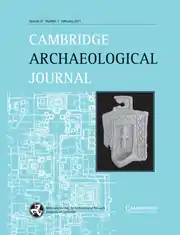Cambridge Archaeological Journal
The Cambridge Archaeological Journal is a peer-reviewed academic journal for cognitive and symbolic archaeology published by Cambridge University Press on behalf of the McDonald Institute for Archaeological Research.[1] It was established in 1991 and is published triannually.[2] It includes major articles, shorter notes, book reviews,[3] and review articles, especially those related to cognitive archaeology.[4]
 | |
| Discipline | Archaeology |
|---|---|
| Language | English |
| Edited by | John Robb |
| Publication details | |
| History | 1991–present |
| Publisher | Cambridge University Press on behalf of the McDonald Institute for Archaeological Research (United Kingdom) |
| Frequency | Triannually |
| Standard abbreviations | |
| ISO 4 | Camb. Archaeol. J. |
| Indexing | |
| ISSN | 0959-7743 |
| LCCN | 91658653 |
| Links | |
The current editor-in-chief is John Robb, (University of Cambridge),[5] while from 1990-2005 the editor was Chris Scarre (McDonald Institute).[6][7]
Scope
The journal's focus is on the role and development of human intellectual abilities.[8] It covers theoretical and descriptive archaeological research, ranging from art and iconography, burial and ritual, representations and symbolism, to the evolution of human cognition.[2][9] The journal covers all eras and all areas,[10] from the Lower Palaeolithic to Colonialism, and from the Pacific to Central Asia.[2] Of note, figurine studies have been widely discussed in several surveys, but in particular in its 1996 feature "Can We Interpret Figurines?".[11] The journal often publishes on Maya archaeology.[12]
References
- Arq: architectural research quarterly. Emap Construct. 2001. p. 189. Retrieved 16 April 2011.
- "Cambridge Archaeological Journal". McDonald Institute for Archaeological Research. Archived from the original on 14 March 2011. Retrieved 16 April 2011.
- Cambridge University Press. Online Journals (2000). Arq: architectural research quarterly. Emap Construct. Retrieved 16 April 2011.
- Greene, Kevin; Moore, Tom (23 July 2010). Archaeology: An Introduction. Taylor & Francis. pp. 310–. ISBN 978-0-415-49638-4. Retrieved 16 April 2011.
- Robb, John (2007). The early Mediterranean village: agency, material culture, and social change in Neolithic Italy. Cambridge University Press. p. i. ISBN 978-0-521-84241-9. Retrieved 16 April 2011.
- Scarre, Christopher; Scarre, Geoffrey (2006). The ethics of archaeology: philosophical perspectives on archaeological practice. Cambridge University Press. p. vii. ISBN 978-0-521-54942-4. Retrieved 16 April 2011.
- "Prof Chris Scarre, MA PhD FSA". Durham University. April 16, 2011. Retrieved 16 April 2011.
- British Archaeological Association (1991). Journal of the British Archaeological Association. British Archaeological Association. p. 152. Retrieved 16 April 2011.
- Wilson, Robert Andrew; Keil, Frank C. (2001). The MIT encyclopedia of the cognitive sciences. MIT Press. p. 124. ISBN 978-0-262-73144-7. Retrieved 16 April 2011.
- "Cambridge Archaeological Journal". Journals.cambridge.org. Retrieved 16 April 2011.
- Pollock, Susan; Bernbeck, Reinhard (2005). Archaeologies of the Middle East: critical perspectives. Wiley-Blackwell. pp. 155–. ISBN 978-0-631-23001-4. Retrieved 17 April 2011.
- McKillop, Heather Irene (2004). The ancient Maya: new perspectives. ABC-CLIO. pp. 14–. ISBN 978-1-57607-696-5. Retrieved 16 April 2011.